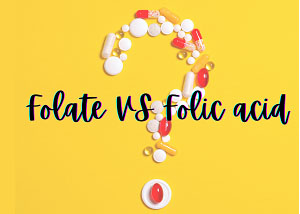
know your calcium
June 28, 2022
How to reduce heat while eating mangoes
June 28, 2022People often use the two interchangeably as they are both forms of vitamin B9 but in fact there is an important difference.
Folic acid is the synthesized version that is commonly used in processed foods and supplements. folic acid cannot be found naturally in the body. folic acid can be converted into usable forms of folate but the conversion is limited in humans. Also folic acid does not cross the placenta like the natural folate.

Whereas ,Folate and its cousin folic acid are vital for developing a healthy baby because it prevents neural tube defects. Since the neural tube develops within the first 28 days of pregnancy, it is recommended all women of childbearing years consume folate.
Folate prevents certain heart abnormalities, cleft palate and cleft lip. It also lowers the risk of developing anemia, miscarriage, preterm delivery and low birth weight.
Folate (vitamin B-9) is important in red blood cell formation and for healthy cell growth and function. The nutrient is crucial during early pregnancy to reduce the risk of birth defects of the brain and spine. The recommended daily amount of folate for adults is 400 micrograms (mcg). Women who are planning pregnancy or could become pregnant are advised to consume 400 to 1,000 mcg of folic acid a day.
Folate is found mainly in dark green leafy vegetables, beans, peas and nuts. Fruits rich in folate include oranges, lemons, bananas, melons and strawberries.
A diet lacking foods rich in folate leads to a folate deficiency. Folate deficiency can also occur in people who have conditions, such as celiac disease, that prevent the small intestine from absorbing nutrients from foods (malabsorption syndromes).
While taking supplements just make sure you choose that contains naturally occurring folates instead of folic acid. So check the label. If it says Folate, 5 Methyl-Tetrahydrofolate, L-Methylfolate, Metafolin' it is safe to have.
But if it says 'Folic Acid' in the ingredients , give it a pass..




